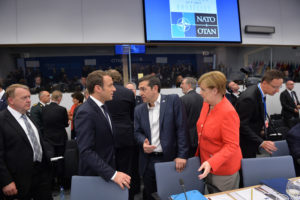Letter from La Vigie n° 155 of 25 November 2020
After Hong Kong, Taiwan?
After the early abrogation of the Basic Law in Hong Kong and the promulgation of the National Security Law on 1 July 2020, Beijing has weakened its international credibility while sending a clear signal on how to settle international disputes, considered by the Communist Party as Chinese internal affairs. In an unstable strategic context, where relations between China and the United States are bound to be tense, the normalisation of Taiwan’s status is a matter for which the best chancelleries must prepare themselves in a concerted manner, at the risk of finding themselves once again without one.
To read the article, click here
The new Macron doctrine
The recent interview given by the President of the Republic on foreign policy constitutes a “Macron doctrine”. The diagnosis is clear and bears witness to a fine evolution. The denunciation of a Washington consensus is lucid, the call for European strategic autonomy is clear, the designation of a Euro-African axis is a priority. Nevertheless, this brilliant discourse may lack pedagogy with our neighbours and partners and hardly conceals the limits of the implementation of this ambition.
To read the article, click here
Lorgnette: Russian Sudan
Russia seems to be everywhere. It can be seen in Syria, the Caucasus, Libya, Egypt (LV 99) to mention only the Mediterranean rim. It has just signed an agreement to establish a naval base in Sudan. This shows a “grand strategy” that articulates several elements: firstly, the return to Africa that we have been seeing for many years, with actions in CAR and stronger links with various powers on the continent. Secondly, a stubborn opening towards “hot seas”, in this case the Indian Ocean. When China and Japan set up bases in Djibouti, Moscow moved a little further south, allowing a relay to East Africa and the Indo-Pacific. Finally, let us note the consolidation of a reborn maritime power, further densified by the opening of the northern passage.
From the Sudanese point of view, while the transitional regime saw the departure of Omar el Bechir (see note and LV 123), the opening of the game is obvious: it is a question of finding relays outside the American and Saudi sponsors (even if Khartoum has moved closer to Israel). But it is also a question of weighing up against problematic neighbours (southern Sudan, Egypt, even Ethiopia and Chad).
JOCV
Subscribers: click directly on the links to read online or download the pdf number (here), always with your login/password. New reader: read the article in the issue, by clicking on each article (2.5 €), or by subscribing (discovery abo 17 €, annual abo 70 €, orga abo 300 € HT): here, the different formulas.
Crédit photo : Le grand continent

